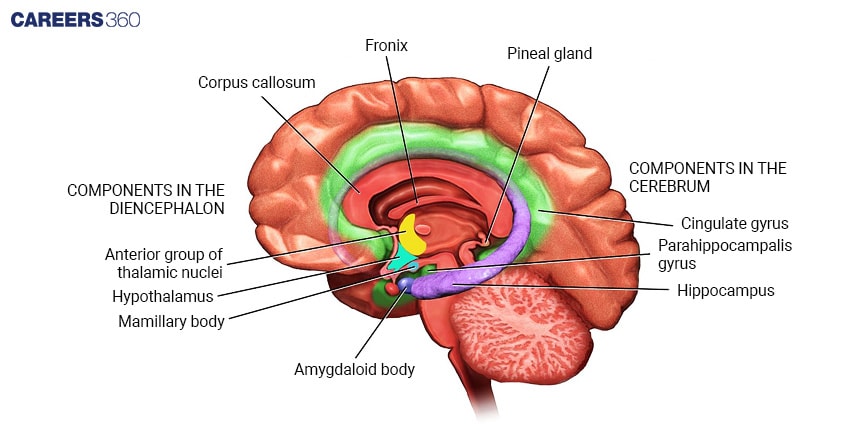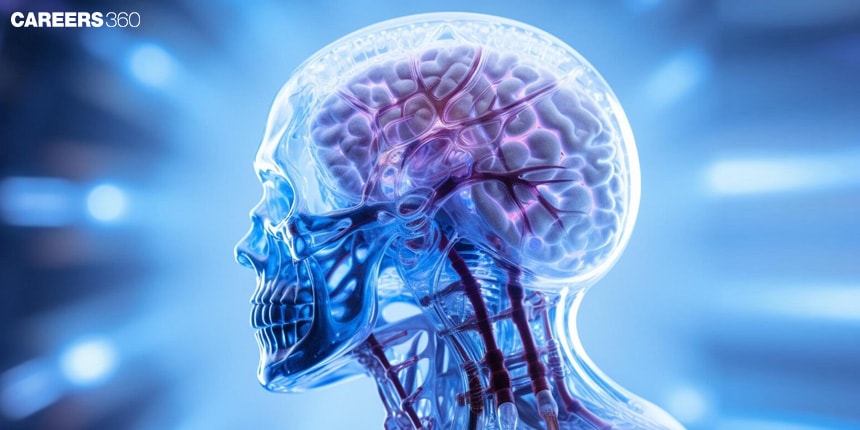Limbic System: Overview, Definition, Function, Meaning, Diagram
What Is A Limbic System?
It is a complicated system of structures lying deep in the brain, related to emotions, memory, and some forms of behavioural regulation. The limbic system mainly governs our emotional responses and forms long-term memories.

Components Of The Limbic System
The various components of the limbic system are:
Amygdala
Functions of the amygdala include the processing of emotions related to fear, anger, and pleasure.
It plays a key role in the formation of emotional memories.
NEET 2025: Mock Test Series | Syllabus | High Scoring Topics | PYQs
NEET Important PYQ's Subject wise: Physics | Chemistry | Biology
New: Meet Careers360 B.Tech/NEET Experts in your City | Book your Seat now
- What Is A Limbic System?
- Components Of The Limbic System
- Limbic System Functions
- Autonomic Nervous System
- Conclusion
- Recommended video on "Limbic System"

Hippocampus
The hippocampus participates in the procedure of forming new memories and navigation in space.
It is the structure responsible for changing or transposing short-term into long-term memory.
Hypothalamus
The hypothalamus controls the independent functions of hunger, thirst, and body temperature.
It acts to control the secretion of hormones through the pituitary.
Thalamus
The thalamus acts as the relay station for sensory and motor signals. It relays them through towards the cerebral cortex.
Besides, it has also been engaged in the regulation of consciousness, sleep and alertness.
Limbic System Functions
The functions of the limbic system are:
Emotional Regulation
The Limbic system plays a vital role in controlling emotions and their responses.
It makes us capable to use right time emotional responses when we undergo any situation.
Memory Formation
The hippocampus and amygdala interconnect with each other to form and store memories, primarily emotional memory.
This helps us remember past experiences and repeat or avoid certain experiences based on the outcome of those experiences.
Behaviour And Motivation
The limbic system is involved in survival behaviours like eating, drinking and reproduction.
It also is involved in motivational and reward-seeking behaviour.
Interaction with Other Brain Areas
Cerebral Cortex
The limbic system interacts with the cerebral cortex to integrate emotion and cognition.
This interplay gives rise to the expression of particular behaviours, that is, executive decisions.
Autonomic Nervous System
The autonomic nervous system is controlled by modulations from the limbic system, particularly the hypothalamus, which deviates from physiological responses to emotions.
These modulations enable the body to respond appropriately to an emotional event.
Key Points to Remember
It primarily controls the emotional responses and lies memory.
It contains structures such as the amygdala, hippocampus, hypothalamus, and thalamus.
The limbic system controls behaviour, motivation, and physiological responses.
Conclusion
The limbic system plays a very vital role in our emotional lives and memory processes. Its sophisticated networking of constituents allows for a response to emotional impulses and thus memory formation and behaviour for survival and well-being.
Recommended video on "Limbic System"
Frequently Asked Questions (FAQs)
It is composed of the amygdala, hippocampus, hypothalamus, and thalamus.
The amygdala processes the emotions of fear, anger, pleasure, and other feelings and creates emotional memory.
The hippocampus makes new memories, and then takes short-term memory and transitions it into long-term memory.
The hypothalamus is responsible for autonomic functions—hunger, thirst, body temperature—and endocrine functions, via its control of release of hormones from the pituitary.
The limbic system interconnects with the cerebral cortex in fusing affective and thought processes to control very intricate behaviours and decisions.
Also Read
30 Nov'24 10:55 AM
29 Nov'24 08:48 PM
29 Nov'24 06:52 PM
29 Nov'24 05:35 PM